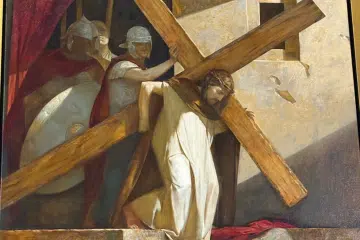Catholic at Home: Prepare Now for What Comes Next
I attended a funeral a couple months ago. The dear lady who passed away was 90 and she clearly had been treasured by the large number of family and friends present. Between the grief among the congregation and my close proximity to the casket during Mass, the reality of death was quite literally in front of me. Regardless of the details of our time on earth – vocation, career, passions, pursuits – none of us is getting out of here alive. With this certainty in mind, I’ve been casting a hard gaze on my life lately, and trying to examine it through the lens of eternity. After all, what happens on the other side of death will last a lot longer than anything we have going on right now.
Prepare Yourself
St. Ambrose said, “You must not be greatly troubled about many things, but you should care for the main thing – preparing yourself for death.”
I’ll be honest, I initially wondered if St. Ambrose, in all his wisdom, was a bit off – is preparing for death really the main thing? Shouldn’t it be sacrifice or my family or growing in relationship with Jesus? Not exactly, I realized. Made in the image and likeness of God, we’re meant for total union with Him in Heaven, and the way to get there is death. So often we think of passing away as the end of life, but it’s the moment we’ve all been waiting for.
If we’re preparing for death, per St. Ambrose’s advice, then it’s time to get our affairs in order – not necessarily choosing a plot, but matters of the soul.
Let It Go
To get started on eternity, we have to let go of what doesn’t last: “Is not he a fool who seeks after happiness in this world… and exposes himself to the risk of being unhappy in the next…? We do not fix our affections on borrowed goods, because we know that they must soon be returned to the owner.”
What came to mind when I read this line from St. Alphonsus Liguori was our general attachment to stuff. Material possessions are so celebrated in our culture that it has become difficult to see how little they matter in the grand scheme. To keep a healthy perspective on material things, give away what you don’t need. Tithe to your parish. Purge excessive possessions at home. The classic adage “You can’t take it with you,” applies here, but what we can take with us is a heart focused on Jesus, made so by detaching from what’s temporary.
In letting go of what’s unimportant, we have to get a grip on what matters, or, rather, who matters. St. Teresa of Calcutta said, “At the end of life, we are going to be judged on the basis of our love for one another.” This alone is a sufficient examen for our interactions at home. Held up next to my life as a wife and mom, St. Teresa shines a light on how much my disposition makes an impact in my house. My husband and children are priceless to Jesus, and we have to try to love them as such. If I’m shooting for living my best life, I’ll do it by loving as Christ loves – person by person – and Christ Himself will mark my efforts.
A Dose of Humility
But no one bats a thousand all the time. Faced with our shortcomings and sins, the next step is Confession. Approaching our merciful Father with hat in hand and humility at heart, we are made new and our souls become bright with purity. St. Thomas Aquinas prescribed confession as medicine for the sickness of sin, which separates us from God. There?s no better way to prepare for death and invest in eternity than to close the gap between ourselves and Jesus.
The main event of our lives on earth is death – the launch into union with our Father. Following the holy wisdom of St. Ambrose, St. Teresa and St. Thomas Aquinas will cultivate life, not just here on earth, but after death. It’s in keeping that moment in front of us that we can live more intentionally, investing ourselves in what will last.














